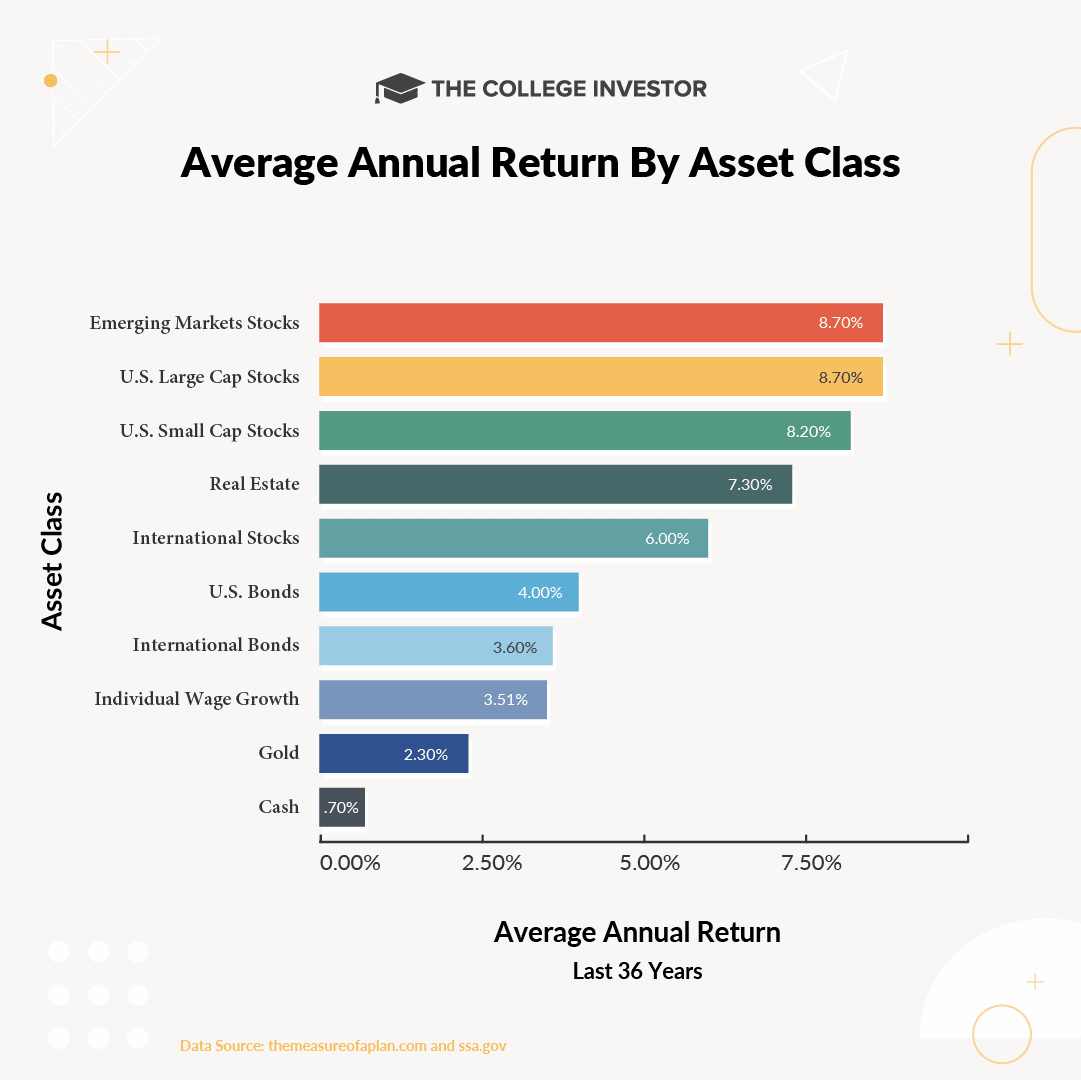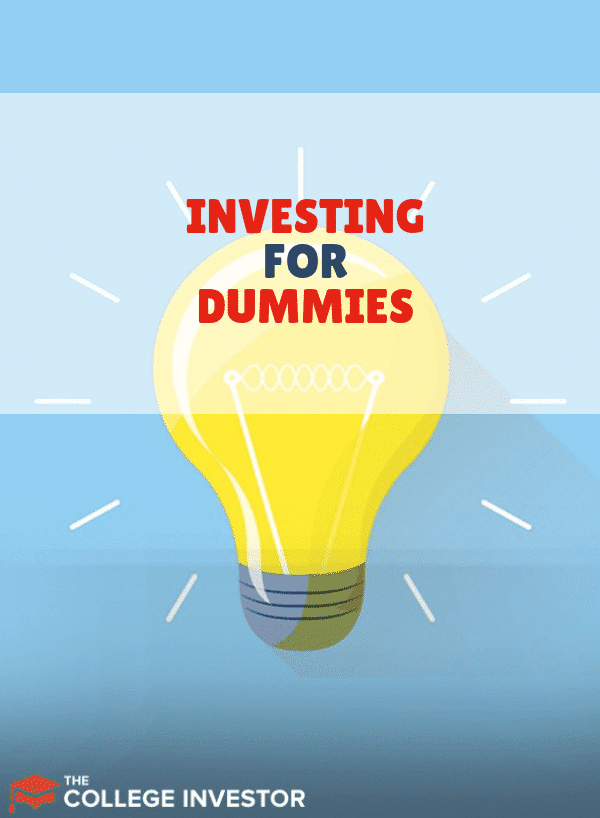
I love the book series "For Dummies" because they take a light hearted approach to making complex subjects easy. That's why I wanted to create this Investing For Dummies guide because investing is complex - and I want to make it easy for you to start.
It's so essential to start investing (especially at a younger age) because the power of investing is magnified with time. The longer you invest, the more successful you can potentially be.
So, even if you're a dummy and don't know where to start - this guide will walk you through the basics of everything you need to know about starting to invest.
Here's a couple other guides that you might find useful depending on your age:
What Is Investing?
Before we even dive into how to invest, it's important to understand what investing actually is.
When you invest, you are becoming an owner of a company. When you buy a share of stock, you are owning a tiny little piece of that company. If the company does well, you are typically rewarded with the price of the stock going up, and if it does badly, the price can go down.
Because you do have the potential to lose money, you are compensated a bit more than other places to park your money (like FDIC insured money market accounts).
There are multiple different types of products to invest in:
- Stock - a piece of ownership in a company
- Bond - a piece of debt of a company (think of it like an IOU)
- ETF - a basket of stocks or bonds
- Mutual Fund - a basket of stocks or bonds
We recommend novice investors focus on ETFs and Mutual Funds. They are basically the same thing, but there are nuances as to why they are different that don't matter for this discussion.
With an ETF or Mutual Fund, you are investing in a basket of stocks or bonds. So, you might have heard of the S&P 500. These are the 500 biggest companies in the United States. If you invest in an S&P 500 ETF, you now own a tiny little piece of all 500 companies. It's an easy way to build a portfolio.
Why Invest?
So, now that you understand the basics of investing, why would you invest versus just saving your money - especially since there is the risk of loss?
Because, over time, investing has provided better long term returns that other places of putting your money. And if you want to retire someday, you need your money to work for you and grow. Saving alone will probably not get you to where you need to be.
Here's some historical perspective on returns for different asset types (long term 80+ year results)
- Stocks: 9% Annual Return
- Government Bonds: 4% Annual Return
- Real Estate: 7.3% Annual Return (based on a commercial/residential mixed portfolio)
- Savings Accounts: 0.8% Annual Return (based on 3 month treasury bills)
The problem with these numbers is two-fold:
1. They're historical - meaning that because this happened in the past doesn't mean it will happen exactly the same in the future.
2. They're average - meaning that you go up and down each year.
However, for the long term, investing has outperformed keeping your money in cash over the long run. So, if you're 30 years old, and looking at how to grow your money to a solid amount by the time you're 65, investing is the way to go. Savings alone just won't cut it for you.

Getting Started Investing For Dummies
Now that you know the basics of what investing is and why you should invest, you need to understand some basics on getting started investing.
To start investing, you first need to figure our your goals:
- Are you investing for retirement?
- Are you saving for something in the near future?
Retirement: If you're saving for retirement, investing is typically a good choice. Long term returns on investing typically outperform other investments
If you're investing for retirement, you likely want to open a retirement account: Roth IRA or Traditional IRA. These accounts have rules that allow you to invest up to the IRA Contribution Limit. In the account, the money grows tax free, but you can only take it out without penalty in retirement - which can be limiting for some. But the tax benefits make it worth it!
Saving For The Near Future: Investing probably isn't the right thing for you. You are better off just savings your money, or maybe looking at a Certificate of Deposit. Remember, investing is for the long term, and in the short term, you can lose money. If you need the money in the near future, you likely shouldn't invest.
If you want to invest for the medium term, and don't want your money locked up into retirement, you can still open a regular brokerage account.
Once you know why you’re investing, you need to open a brokerage account. This is the actual account that holds your investments. It's a little different than a savings account, and you usually have to be at a different company than your bank.
Opening Your First Account
Where you open your account really depends on how much you want to do when it comes to your investments.
If you don't want to think about investing at all, and just want it all handled for you, you might consider investing at a robo-advisor like Wealthfront. With a tool like Wealthfront, you open an account, answer some questions, and deposit your money. Wealthfront handles the rest for a small annual fee. It's that easy. You can even setup direct deposits and have it done automatically for you! Check out Wealthfront here.
If you want a little more control over what you invest in, maybe want to pick some of your own investments, check out M1 Finance. They are a free investing platform that requires a little more work, but they do allow you to customize your portfolio beyond their basics. And best of all, it's commission-free. Check out M1 Finance here.
If you want to see all of the options we recommend, here’s a list of companies that allow you to start investing for free.
Investing For Your Style And Personality
Once you have your account open, you need to actually invest your money. This is a step that some people forget to do - they simply deposit money into their brokerage and nothing happens with it.
If you're investing at a robo-advisor like Betterment, this is taken care of for you. But if you're investing anywhere else, you need to go in and choose your investments.
This is the hardest part for most people, because it can be scary and confusing about what to actually invest in.
Here's we like to keep things simple, especially if you're reading Investing for Dummies. That means a simple, small, low cost index funds portfolio.
Here's a few examples we recommend: Lazy Portfolios. If you like the investment, you simply find the symbol (the letters representing the investment), enter that trade, and you're set. If you're investing on M1 Finance, you can setup each symbol as a pie slice to make it really easy for future investments.
Following Up On Your Investments
Once you're invested, you're not done. There is definitely some follow-up that needs to happen on your part. Not a lot, but some.
Once you’ve placed your first trade, you’re not done. A lot of people think that investing is set and forget – and it really isn’t. While investing in mutual funds and ETF is much less hands-on, you should evaluate your portfolio at least once a year, if not once a quarter.
So, after you’ve invested, here is a detailed list of what you need to do after you place a trade.
Then, you should think about setting up automatic investing. This is a great way to build your portfolio over time.
Finally, you have to handle some tax paperwork every year. If you're invested in an IRA, you simply save the paperwork and nothing is required. However, if you're investing in a taxable brokerage account, you need to potentially report your earnings on your tax return every year.
Don't be scared by taxes, it's not complicated for most situations. Here's our list of the best tax software for investors, but you can also consult with a CPA or tax professional if you don't know what to do.

Robert Farrington is America’s Millennial Money Expert® and America’s Student Loan Debt Expert™, and the founder of The College Investor, a personal finance site dedicated to helping millennials escape student loan debt to start investing and building wealth for the future. You can learn more about him on the About Page or on his personal site RobertFarrington.com.
He regularly writes about investing, student loan debt, and general personal finance topics geared toward anyone wanting to earn more, get out of debt, and start building wealth for the future.
He has been quoted in major publications, including the New York Times, Wall Street Journal, Washington Post, ABC, NBC, Today, and more. He is also a regular contributor to Forbes.
Editor: Clint Proctor Reviewed by: Chris Muller
